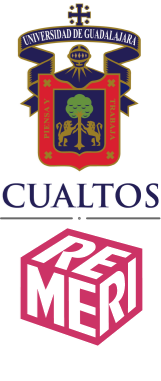Please use this identifier to cite or link to this item:
http://repositorio.cualtos.udg.mx:8080/jspui/handle/123456789/994Full metadata record
| DC Field | Value | Language |
|---|---|---|
| dc.contributor.author | Hernández Contreras, Jorge | - |
| dc.contributor.author | Ponce Rojo, Antonio | - |
| dc.contributor.author | Hernández Vega, Leticia | - |
| dc.contributor.author | Ortega Reyes, Vicente | - |
| dc.date.accessioned | 2020-02-14T15:00:02Z | - |
| dc.date.available | 2020-02-14T15:00:02Z | - |
| dc.date.issued | 2013 | - |
| dc.identifier.citation | Hernández Contreras J., Ponce Rojo A., Hernández Vega L. y Ortega Reyes V. (2013). Uso de la Web 2.0 con fines educativos: el caso de Second Life. Revista Congreso Universidad. Vol. II, núm. 1 | es, en |
| dc.identifier.issn | 2306-918X | - |
| dc.identifier.uri | http://repositorio.cualtos.udg.mx:8080/jspui/handle/123456789/994 | - |
| dc.description | Artículo | es, en |
| dc.description.abstract | RESUMEN La Realidad Virtual surge como un sistema interactivo que permite crear un mundo tridimensional ficticio, con la máxima ilusión de realidad posible, con estas bases nacen los mundos virtuales en 1994. Second Life surge en 2003, y presenta características no antes vistas en los mundos virtuales: una interacción multimedia no-pasiva, un mundo creado por los usuarios. A través de una investigación etnográfica, se exploró la plataforma durante varios días en los cuales se documentó la variedad de aplicaciones que posee. Para tener idea del desarrollo o declive que ha presentado Second Life. Se investigaron los antecedentes históricos y las repercusiones iniciales que tuvo en la sociedad y cultura popular. Del mismo modo, se recopiló información sobre la cantidad de usuarios conectados. Además, de una pequeña investigación acerca de las aplicaciones ya existentes, para poder observar con claridad cuáles son las capacidades actuales. Como resultado de dichos análisis del pasado, actualidad y futuro de la plataforma, se pudieron realizar una serie de propuestas que pretenden la creación de espacios específicos para la educación, utilizando la inmensa gama de posibilidades que Second Life ofrece. ABSTRACT The virtual reality is an interactive system that allows to synthesize a fictitious three-dimensional world, creating the maximum illusion of reality, with these bases are born virtual worlds in 1994. Second Life arises in 2003, and it presents characteristics never seen before in virtual worlds: a multimedia interaction not-passive, a world created by the users. Second Life owns an endless number of technical qualities and applications, in fact that is extremely favorable in many disciplines, among them, the education. Through an ethnographic investigation, the platform was explored during several days and this information is write down in this document. In order to have idea of the development or declivity that has presented Second Life, we investigated the historical antecedents and the initial repercussions that it had in the society and popular culture. In the same way, information was compiled on the amount of connected users. In addition, of a small investigation about the already existing applications, to be able to observe with clarity which are the present capacities. As a result of these analyses of the past, the present time and future of the platform, could be realized a series of proposals: trying the creation of specific spaces for the education, using the immense range of possibilities that Second Life offers. | es, en |
| dc.language.iso | es | es, en |
| dc.publisher | Editorial Universiaria Félix Varela | es, en |
| dc.relation.ispartofseries | Revista Congreso Universidad;Vol. II, núm. 1 | - |
| dc.subject | second life | es, en |
| dc.subject | mundos virtuales | es, en |
| dc.subject | realidad virtual | es, en |
| dc.subject | educación virtual | es, en |
| dc.subject | Web 2.0 | es, en |
| dc.subject | educación 3D | es, en |
| dc.subject | open classroom | es, en |
| dc.subject | aulas de puertas abiertas | es, en |
| dc.title | Uso de la Web 2.0 con fines educativos: el caso de Second Life | es, en |
| dc.title.alternative | Using Web 2.0 for education: the case of Second Life | es, en |
| dc.type | Article | es, en |
| Appears in Collections: | 6104 Artículos | |
Files in This Item:
| File | Description | Size | Format | |
|---|---|---|---|---|
| Uso de la Web 2.0 con fines educativos, el caso de Second Life. Using Web 2.0 education, the case of Second Life.pdf | Documento | 1.06 MB | Adobe PDF | View/Open |
| Enlace a_Uso de la Web 2.0 con fines educativos el caso de second life..htm | Enlace a publicación | 41.96 kB | HTML | View/Open |
Items in DSpace are protected by copyright, with all rights reserved, unless otherwise indicated.


